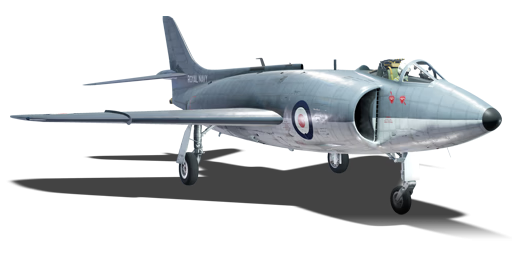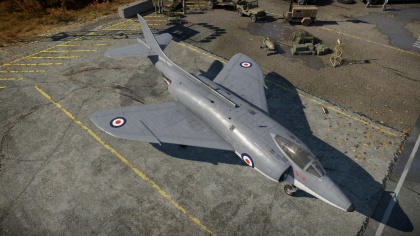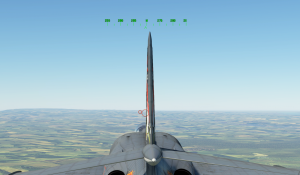Difference between revisions of "Scimitar F Mk.1"
(→External links: Added AirManufacturer template) |
m (→Details: Rudder got buffed) |
||
| Line 66: | Line 66: | ||
! Ailerons !! Rudder !! Elevators !! Radiator | ! Ailerons !! Rudder !! Elevators !! Radiator | ||
|- | |- | ||
| − | | < 620 || < | + | | < 620 || < 450 || < 620 || N/A |
|- | |- | ||
|} | |} | ||
Revision as of 17:36, 11 June 2020
Contents
Description
The Scimitar F Mk.1 is a rank VI British jet fighter
with a battle rating of 8.3 (AB) and 8.7 (RB/SB). It was introduced in Update "Starfighters".
General info
Flight performance
The Scimitar F.1 is a relatively large and heavy aircraft, but it is still extremely capable because of its impressive engines. The Scimitar's two Rolls-Royce Avon 202 engines put out 4,650 kgf of thrust each, giving the Scimitar its fantastic climb rate of over 100 m/s. This outclasses similarly placed jets known for their climb rate (such as the MiG-15) by almost 2 times, and it's capable of gaining speed in a 45° climb. The impressive amount of power means that, assuming you aren't uptiered to 9.7, you will always be the first off the airfield and into combat. The Scimitar has a max speed of just over 1,160 km/h or mach 0.95 on the deck, enough to outrun anything at its BR, and even some missiles too.
The Scimitar turns surprisingly well for its size and weight, thanks to its all-flying tail, and large control surfaces. It will be able to hold its own in a turnfight with most, and can quickly accelerate out of trouble if needed. You should not be turning for too long, as the Scimitar still loses its energy quite quickly in a full turn.
However, we now come to the biggest con of the Scimitar: its rudder. The rudder will lock up gradually until about 700 km/h where it will lose 99% of its effect, making it unusable, and trying to turn or aim conventionally is impossible, often leading to the plane wobbling itself into an uncontrollable flatspin that you can't escape, because you have no rudder control. It is recommended because of this that you only engage low energy targets and use the element of surprise so they cannot evade. The Scimitar does get 4 x AIM-9B missiles, and these can be used on targets that use your lack of a rudder against you.
| Characteristics | Max Speed (km/h at 0 m - sea level) |
Max altitude (metres) |
Turn time (seconds) |
Rate of climb (metres/second) |
Take-off run (metres) | |||
|---|---|---|---|---|---|---|---|---|
| AB | RB | AB | RB | AB | RB | |||
| Stock | ___ | ___ | 15200 | __._ | __._ | __._ | __._ | 1,000 |
| Upgraded | ___ | ___ | __._ | __._ | __._ | __._ | ||
Details
| Features | |||||
|---|---|---|---|---|---|
| Combat flaps | Take-off flaps | Landing flaps | Air brakes | Arrestor gear | Drogue chute |
| ✓ | ✓ | ✓ | ✓ | ✓ | X |
| Limits | ||||||
|---|---|---|---|---|---|---|
| Wings (km/h) | Gear (km/h) | Flaps (km/h) | Max Static G | |||
| Combat | Take-off | Landing | + | - | ||
| 1322 | 583.3 | 650 | 637 | 447 | ~11 | ~3 |
| Optimal velocities (km/h) | |||
|---|---|---|---|
| Ailerons | Rudder | Elevators | Radiator |
| < 620 | < 450 | < 620 | N/A |
Survivability and armour
The Scimitar has one glass 50 mm plate in front of the pilot, and one 12.7 mm steel plate behind the pilot. It has very low survivability because any wing damage will lead to a flatspin, due to its lack of rudder control.
Armaments
Offensive armament
The Scimitar F Mk.1 is armed with:
- 4 x 30 mm ADEN cannons, chin-mounted (160 rpg = 640 total)
Suspended armament
The Scimitar F Mk.1 can be outfitted with the following ordnance:
- Without load
- 4 x 1,000 lb M.C. 1,000 lb Mk.I bombs (4,000 lb total)
- 24 x AP Mk II rockets
- 2 x 1,000 lb M.C. 1,000 lb Mk.I bombs + 12 x AP Mk II rockets (2,000 lb total)
- 4 x AIM-9B Sidewinder missiles
- 4 x AGM-12B Bullpup missiles
- 2 x AGM-12B Bullpup missiles + 2 x AIM-9B Sidewinder missiles
- 2 x 1,000 lb M.C. 1,000 lb Mk.I bombs + 2 x AIM-9B Sidewinder missiles (2,000 lb total)
Usage in battles
Describe the tactics of playing in the aircraft, the features of using aircraft in a team and advice on tactics. Refrain from creating a "guide" - do not impose a single point of view, but instead, give the reader food for thought. Examine the most dangerous enemies and give recommendations on fighting them. If necessary, note the specifics of the game in different modes (AB, RB, SB).
Modules
| Tier | Flight performance | Survivability | Weaponry | ||
|---|---|---|---|---|---|
| I | Fuselage repair | Offensive 30 mm | 60 lb S.A.P. Mark I | ||
| II | New boosters | Compressor | Airframe | 1000 LB MC | |
| III | Wings repair | Engine | New 30 mm cannons | AGM-12B Bullpup | |
| IV | G-suit | Cover | AIM-9B | ||
Pros and cons
Summarise and briefly evaluate the vehicle in terms of its characteristics and combat effectiveness. Mark its pros and cons in the bulleted list. Try not to use more than 6 points for each of the characteristics. Avoid using categorical definitions such as "bad", "good" and the like - use substitutions with softer forms such as "inadequate" and "effective".
Pros:
Cons:
History
Describe the history of the creation and combat usage of the aircraft in more detail than in the introduction. If the historical reference turns out to be too long, take it to a separate article, taking a link to the article about the vehicle and adding a block "/History" (example: https://wiki.warthunder.com/(Vehicle-name)/History) and add a link to it here using the main template. Be sure to reference text and sources by using <ref></ref>, as well as adding them at the end of the article with <references />. This section may also include the vehicle's dev blog entry (if applicable) and the in-game encyclopedia description (under === In-game description ===, also if applicable).
Media
Excellent additions to the article would be video guides, screenshots from the game, and photos.
See also
Links to the articles on the War Thunder Wiki that you think will be useful for the reader, for example:
- reference to the series of the aircraft;
- links to approximate analogues of other nations and research trees.
External links
| Supermarine | |
|---|---|
| Spitfires | |
| Merlin engine | Spitfire Mk Ia · Spitfire Mk IIa · Spitfire Mk.IIa Venture I · Spitfire Mk IIb |
| Spitfire Mk Vb · Spitfire Mk Vb/trop · Spitfire Mk Vc · Spitfire Mk Vc/trop | |
| Spitfire F Mk IX · Spitfire F Mk IXc · Spitfire F Mk XVI | |
| Spitfire LF Mk IX · Plagis' Spitfire LF Mk IXc | |
| Griffon engine | Spitfire F Mk XIVc · Spitfire F Mk XIVe · Prendergast's Spitfire FR Mk XIVe · Spitfire F Mk XVIIIe · Spitfire F Mk 22 · Spitfire F Mk 24 |
| Export | ▄Spitfire Mk Vb/trop · ▃Spitfire LF Mk IXc · ▂Spitfire Mk IXc · Spitfire Mk IXc · Spitfire Mk.IX (CW) · Weizman's Spitfire LF Mk.IXe · ▄Spitfire FR Mk XIVe |
| Seafires | Seafire LF Mk.III · Seafire F Mk XVII · Seafire FR 47 |
| Export | ▄Seafire LF Mk.III |
| Jet fighters | Attacker FB 1 · Attacker FB.2 · Scimitar F Mk.1 · Swift F.1 · Swift F.7 |
| Hydroplanes | Walrus Mk.I |
| Britain jet aircraft | |
|---|---|
| Blackburn | Buccaneer S.1 · Buccaneer S.2 · Buccaneer S.2B |
| British Aerospace | Harrier GR.7 · Sea Harrier FRS.1 (e) · Sea Harrier FRS.1 · Sea Harrier FA 2 |
| British Aircraft Corporation | Strikemaster Mk.88 |
| English Electric | Canberra B Mk 2 · Canberra B (I) Mk 6 · Lightning F.6 · Lightning F.53 |
| Gloster | Meteor F Mk 3 · Sea Meteor F Mk 3 · Meteor F Mk 4 G.41F · Meteor F Mk 4 G.41G · Meteor F Mk 8 G.41K · Meteor F Mk.8 Reaper |
| Javelin F.(A.W.) Mk.9 | |
| de Havilland | Vampire F.B.5 · Venom FB.4 · Sea Venom FAW 20 · Sea Vixen F.A.W. Mk.2 |
| Hawker | Sea Hawk FGA.6 · Hunter F.1 · Hunter F.6 · Hunter FGA.9 · Harrier GR.1 · Harrier GR.3 |
| Panavia | Tornado GR.1 · Tornado GR.4 · Tornado F.3 · Tornado F.3 Late |
| SEPECAT | Jaguar GR.1 · Jaguar GR.1A · Jaguar IS |
| Supermarine | Attacker FB 1 · Attacker FB.2 · Scimitar F Mk.1 · Swift F.1 · Swift F.7 |
| Foreign | Phantom FG.1 (USA) · Phantom FGR.2 (USA) · F-4J(UK) Phantom II (USA) |
| Australia | F-111C |
| India | ▄MiG-21 Bison |
| South Africa | ▄JAS39C |






